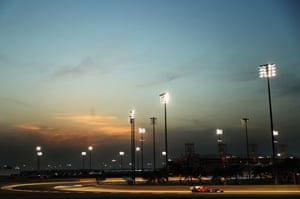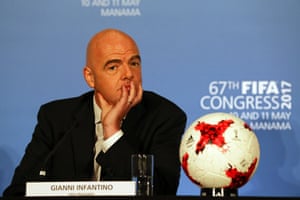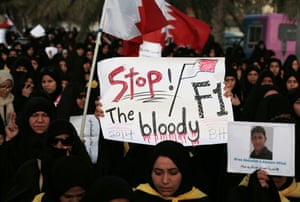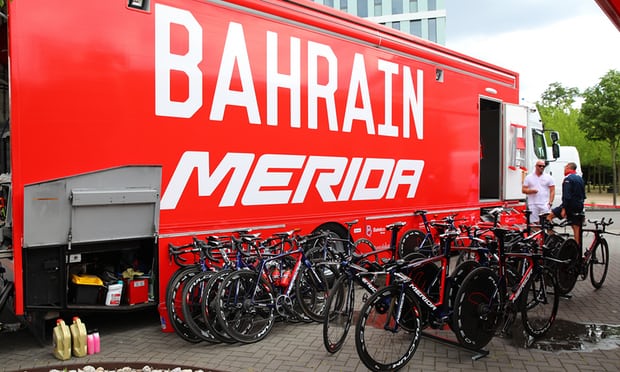Campaign groups argue that Bahrain’s association with glamour sport is used to ‘launder’ a more wholesome image for the country
The cyclist Sonny Colbrelli secured prominent exposure for the name of his Bahrain Merida team early in the Tour de France, heading the group sprint at the end of the second stage in Liège before finishing a creditable sixth. The team’s leader, Ion Izagirre, crashed out on the first day, but Bahrain Merida has already established itself on the world tour, after the star signing Vincenzo Nibali competed through three spectacular weeks in May to claim a third-place finish in the Giro d’Italia.
The cycling team, launched in January with an estimated £13.7m budget by Sheikh Nasser bin Hamad al-Khalifa, a son of the ruling King Hamad bin Isa al-Khalifa, is the latest venture which will help to promote the autocratically ruled, troubled country through an association with globally televised sporting events.
The Formula One grand prix is still a fixture in Bahrain, lending the island its super-fuelled glitz every year. Sheikh Nasser launched the Bahrain Endurance 13 triathlon team in 2015, with a stated aim of promoting sport’s values, and his belief that “through triathlon, people can enjoy a better life”. The Bahrain shirt is now worn by the English Olympic gold medallist Alistair Brownlee, among other international triathletes.
Sheikh Nasser is a brigadier-general in the Bahrain army and commander of the royal guard, although not a member of the government or council of ministers, to which King Hamad has appointed 12 members of his Khalifa family. A sports enthusiast, Sheikh Nasser occupies the most senior positions in several of the country’s sports bodies, including as president of the Olympic committee. On 11 May Fifa welcomed him on to the stage at its congress held in the Bahrain capital Manama, where Fifa’s president, Gianni Infantino, thanked him for hosting the congress in “your beautiful country”.
In his speech, Sheikh Nasser said of hosting the congress: “This adds another dimension to our national vision to be an island that hosts, supports, organises, develops and participates in the success of the global sports movement … Let’s widen participation and turn football into a true catalyst for diversity, tolerance and excellence.”

The following day, the Guardian met people who have suffered beatings and torture during years of brutal repression by the country’s rulers; they said that thousands of people accused of agitating against the regime are now in prison. On a small island populated by approximately 600,000 citizens, the Shia Muslim population have long complained that they are discriminated against in employment and housing by the Khalifa regime, which adheres to the Sunni branch of Islam. The government fears the political and religious influence of Iran on the Shia community, and has responded to campaigns for greater democracy and equality with increasingly thuggish persecution.
Just a few miles up the Sheikh Khalifa bin Salman highway from the five-star hotels and security-ringed convention centre where the rituals of the Fifa congress were accommodated, the sinister side of Bahrain was in open view. There, mostly Shia towns including Diraz, strongholds of protest and opposition to the Khalifa regime, were blockaded, armoured police vehicles parked menacingly at the entrances.
That day, 12 May, Sheikh Nasser and King Hamad were in England, hosted by the Queen at the Royal Windsor Horse Show, where two prestige events were sponsored by Bahrain and Sheikh Nasser himself presented the King’s Cup.
Just 11 days later, the contrast can hardly have been greater between those royal pleasantries, and the Bahrain regime’s latest bloody crackdown on its citizens. While Nibali was winning the Giro’s most iconic and talked-about stage, up and over the Stelvio pass in the Alps of northern Italy, on 23 May Bahrain’s security forces finally ended their long stand-off, and stormed Diraz.
The crisis there had resulted from the regime outlawing the main Shia opposition party Al-Wefaq last year, stripping Bahrain’s most senior Shia priest, Ayatollah Isa Qassim, of citizenship, accusing him of money‑laundering and being in a hostile alliance with Iran. Local supporters crowded around his house in Diraz to prevent the authorities arresting him, until a Bahraini court found him guilty and security forces advanced into the town.
According to experts appointed by the United Nations office of the high commissioner for human rights (OHCHR), the Bahrain forces used “excessive and lethal force to disperse peaceful protestors” – not for the first time – resulting in five deaths which the OHCHR condemned as unlawful killings. Dozens more people were injured in the assault, and 286 people are said to have been arrested and detained. Grimly familiar accounts of torture by the security services have seeped out again from Bahrain’s police cells. The dissolution of the National Democratic Action Society (Wa’ad), a non-religious political party, followed on 31 May.
“Over the past year, there has been a sharp deterioration of the human rights situation in the country,” the OHCR experts said. “This has included unacceptable restrictions on the rights to freedom of expression, freedom of association and peaceful assembly, aimed at muzzling any discordant voice and suppressing dissent … It is tragic that while security forces are meant to protect life, their actions have shown otherwise.
“The authorities have resorted to drastic measures to curb dissenting opinions such as torture, arbitrary detention, unfounded convictions, the stripping of citizenship, the use of travel bans, intimidation, including death threats, and reprisals for cooperating with international organizations, including the Office of the High Commissioner for Human Rights.”
The 2011 grand prix was moved from Bahrain after the government’s notoriously brutal response then to the mass demonstrations at the Pearl roundabout in Manama, but returned in 2012 and has continued to lend prestige to the regime every year since. After that 2011 crackdown the Bahrain Independent Commission of Inquiry (BICI), appointed by the government itself, found that the security services’ actions resulted in the deaths of 13 civilians, due mostly to the use of “excessive and unnecessary lethal force”, and that five more people in the custody of the Ministry of the Interior died having been tortured. Eight more civilians were found to have died due to tear gas, a ninth after being attacked by police officers, another woman had a fatal heart attack while witnessing security forces kicking and beating her neighbour’s son with batons.
During that repression, Sheikh Nasser himself called publicly for the punishment of sportspeople who had taken part in demonstrations, and retribution did follow. On television on 4 April 2011, Sheikh Nasser issued this injunction: “To everyone that demands the fall of the regime, may a wall fall on their heads. Everyone involved in such issues and networks will be punished. Whether he is an athlete, an activist or a politician, he will be punished in this time. Today is the judgment day … Bahrain is an island and there is no escape.”

The BICI reported that an athlete named in that programme was arrested the following day. A week later, Nasser ordered a committee of inquiry to investigate which sportspeople had taken part, and to punish them. Its chairman was to be Sheikh Salman bin Ebrahim al-Khalifa, another member of the extended ruling family and a senior figure in world football administration, president of the Asian Football Confederation, candidate for the Fifa presidency last February, when he came second to Infantino.
Sheikh Salman and his representatives state that the committee was never constituted and never sat, and that he did not take part in identifying athletes for punishment. The Bahrain Football Association did announce it intended to sanction players and clubs, not for participating in demonstrations, but for breaching regulations relating to the fulfilment of fixtures. More than 150 professional sportspeople were widely reported to have been arrested, detained, tortured, imprisoned or excluded from their sports for taking part in the pro‑democracy demonstrations.
Since the protests, according to a report in June 2012 by the European Centre for Constitutional and Human Rights (ECCHR) based in Berlin, allegations were made in Bahrain court proceedings by two people who claim that Sheikh Nasser was personally involved in beating and torturing them during the 2011 crackdown.
The two men were among 14 opposition activists sentenced to long‑term prison sentences by a military court in June 2011 for their part in the pro-democracy demonstrations. Amnesty International declared the 14 men prisoners of conscience because it believed none advocated any violence during the protests. The UN OHCHR said it was deeply concerned by the harsh sentences and said then: “The trials appear to bear the marks of political persecution.”
In response to the report, the Bahrain government wrote to the ECCHR in June 2012 rejecting the allegations against Sheikh Nasser and denying that he had any involvement in torture. Sheikh Nasser’s representatives have also told the Guardian that he wholly rejects the allegations that he participated in beatings and torture.
Separately, a victim of beatings and torture by Bahraini security services following the 2011 crackdown, now based in the UK, has been seeking to persuade the British authorities to have Sheikh Nasser prosecuted for torture. In July 2012, statements including the alleged victims’ testimony and the ECCHR report were submitted to the director of public prosecutions. The dossier was passed to the war crimes team of the Metropolitan police counter terrorism command, but the Crown Prosecution Service has said that on the basis of the dossier submitted to it the police are not investigating. The Bahraini torture victim’s lawyers say this is because key witnesses remain in prison, so are impossible to interview, but they have written to the Home Office, seeking Sheikh Nasser’s exclusion from the UK.
Sheikh Nasser’s representatives point out that the allegations of torture have not been tested in a British court, and that there are no proceedings against him. He has remained free to travel to Britain and other countries despite the allegations having been made, and has never been arrested or questioned by any authorities. In fact, he and King Hamad could hardly be more welcome in this country, having enjoyed the company of the Queen and Prince Andrew at the Royal Windsor Horse Show.
A small group of Bahrainis held a protest at the show, then complained that members of their family in Bahrain were summoned to their local police station at the same time, in an orchestrated operation. The protestors’ family members were interrogated aggressively, they said, and explicitly told to have the protest in England called off.

Sayed Ahmed Alwadaei, director of advocacy at the Bahrain Institute for Rights and Democracy based in London, said his sister was called to the Muharraq police station. “This is a new low by the Bahraini authorities,” Alwadaei said, “blackmailing activists in the UK by detaining their family members in Bahrain.”
The campaign groups Human Rights Watch and Amnesty International, which have persistently criticised the Bahrain regime for its repression, argue that its association with glamour sport is used to “launder” a more wholesome image for the country. Like other gulf states, Bahrain is contemplating a future without plentiful income from oil, and has developed an economic plan to 2030 based on diversifying its industries and attracting tourists. The Bahrain Merida cycling team is backed by a roster of Bahraini companies and state authorities, including the Mumtakalat sovereign wealth fund and the Bahrain Economic Development Board, which promotes the country as a destination, describing it as “the home of motorsport in the Middle East”.
Nicholas McGeehan, the Bahrain, Qatar and United Arab Emirates researcher for Human Rights Watch, says: “The professional cycling team will give the country maximum exposure for a relatively modest investment. The problem for Bahrain as it seeks to launder its image is that there is a lot to cover up, given its blood‑spattered modern history and rapidly deteriorating situation.”
Amnesty International UK’s head of policy and government affairs, Allan Hogarth, says: “It seems pretty clear that the Bahraini authorities have stepped up efforts to associate the country with major sporting events as glitzy cover for an ever-worsening human rights crackdown. For the most part, Bahrain’s harnessing of the glamour and prestige of sport has helped deflect attention from the arrests of peaceful critics, reports of tortured detainees, unfair trials and death sentences.”
These horrors have been perpetrated in Bahrain during the modern era in which sports governing bodies state a commitment to human rights, and to discouraging repressive regimes from using sporting events as cover. Asked about the Bahrain Grand Prix, a Formula One spokesman replied with a general expression of support for human rights, but said it is not “a competent authority to determine the facts nor to judge whether any local laws have been contravened”. The spokesman presented the argument that hosting the grand prix in fact improves human rights in Bahrain, saying: “Our partners at the Bahrain International Circuit have put together an event that has attracted race fans and families from across the region, and representing all walks of life.”
A Fifa spokesman said football’s world governing body “is fully committed to respecting human rights” and believes its intervention, asking the Bahrain Football Association to report to it on the 2011 abuses, “is likely to have contributed to the improvement in the situation of a number of sportspeople”. Sheikh Salman’s representatives said he was involved in reconciliation efforts. Asked whether Fifa was colluding in the country’s image-laundering by siting its congress in Bahrain, a Fifa spokesperson said: “While we do recognise the importance of seeking to address the potential involvement of Fifa’s member associations in adverse human rights impacts, we do not share the criticism regarding the potential human rights implications of the congress.”

The International Triathlon Union (ITU) also sent the Guardian a general statement of commitment to human rights, and it too suggested that the sport itself could “help overcome” the Bahrain regime’s repression: “The strong values always portrayed by ITU and the triathlon family will surely help overcome current situations in a number of countries and federations around the world.”
The Royal Windsor Horse Show did not respond to questions about human rights in Bahrain, and was positive about the sponsorships: “The Kingdom of Bahrain has a history of supporting Fédération Equestre Internationale equestrian sporting events around the world and their support for the Royal Windsor Horse Show allows the organisers to deliver the best possible results.” Buckingham Palace declined to comment.
The Foreign Office, which has been criticised by human rights groups for being too indulgent of Bahrain because of the country’s geographic importance, said the British government believes in working with the country, and did register concerns with the UN Human Rights Council in March.
Cycling’s world governing body, the UCI, did not respond to questions about human rights and the Bahrain Merida team, neither did the team itself, nor Merida, the Taiwanese bike manufacturers. The Bahrain Endurance 13 team did not reply to questions, while a representative for Alistair Brownlee offered no comment in response to questions about his decision to sign up. The manager of the triathlon team, Chris McCormack, has previously said that some athletes considered Bahrain’s human rights record and decided that joining the team “wasn’t for them”.
Sheikh Nasser’s legal representatives replied to the Guardian’s questions by vehemently denying that he had been personally involved in torture in 2011, but did not offer any explanation for his call in 2011 for punishment and “a wall to fall” on protestors.
The representatives stated that Sheikh Nasser has been involved in sporting activity since he was 12, and is motivated by a genuine love of sport. They also pointed out although he is a member of the Khalifa family, he is not a member of the government, and said therefore that he is not personally implicated in the human rights abuses.
None of the people with whom the Guardian talked in Bahrain the day after the Fifa congress felt able to be quoted now. They said the climate of repression is so fearful that they and their families are in danger of arrest, torture and potential long prison sentences if they say anything considered critical of the regime. For them Bahrain is not the glamorous haven of sporting values presented by teams and athletes who bear its name; it is an island, as Sheikh Nasser himself said, from which there is no escape.


